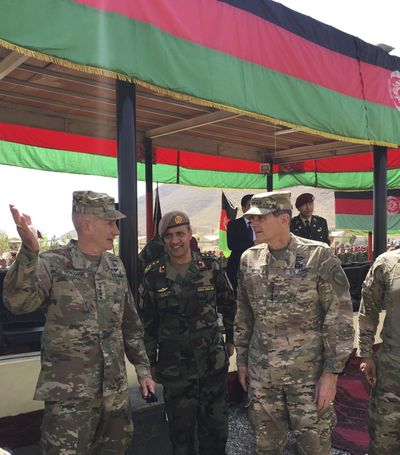Trump will address path forward on Afghanistan

CAMP MOREHEAD, Afghanistan – Signaling that the U.S. military expects its mission to continue, the top U.S. commander in Afghanistan on Sunday hailed the launch of the Afghan Army’s new special operations corps, declaring that “we are with you and we will stay with you.”
Gen. John Nicholson’s exhortation of continued support for the Afghans suggested the Pentagon may have won its argument that America’s military must stay engaged in the conflict in order to ensure terrorists don’t once again threaten the U.S. from safe havens in Afghanistan.
The White House announced that President Donald Trump would address the nation’s troops and the American people Monday night to update the path forward in Afghanistan and South Asia.
Nicholson, speaking prior to the White House announcement, said the commandos and a plan to double the size of the Afghan’s special operations forces are critical to winning the war.
“I assure you we are with you in this fight. We are with you and we will stay with you,” he said during a ceremony at Camp Morehead, a training base for Afghan commandos southeast of Kabul.
The Pentagon was awaiting a final announcement by Trump on a proposal to send nearly 4,000 more U.S. troops to Afghanistan. The added forces would increase training and advising of the Afghan forces and bolster counterterrorism operations against the Taliban and an Islamic State group affiliate trying to gain a foothold in the country.
The administration has been at odds for months over how to craft a new strategy for the war in Afghanistan amid frustrations that 16 years after 9/11 the conflict is stalemated.
The Afghan government only controls half of the country and is beset by endemic corruption and infighting. The Islamic State group has been hit hard but continues to attempt major attacks, insurgents still find safe harbor in Pakistan, and Russia, Iran and others are increasingly trying to shape the outcome. At this point, everything the U.S. military has proposed points to keeping the Afghan government in place and struggling to turn a dismal quagmire around.
U.S. Defense Secretary Jim Mattis said he is satisfied with how the administration formulated its new Afghanistan war strategy. But he refused to talk about the new policy until it was disclosed by Trump.
He said the deliberations, including talks at the Camp David presidential retreat on Friday, were done properly.
“I am very comfortable that the strategic process was sufficiently rigorous,” Mattis said, speaking aboard a military aircraft on an overnight flight from Washington to Amman, Jordan.
Months ago, Trump gave Mattis authority to set U.S. troop levels in Afghanistan, but Mattis said he has not yet sent significant additional forces to the fight. He has said he would wait for Trump to set the strategic direction first.
Trump wrote on Twitter on Saturday that he had made decisions at Camp David, “including on Afghanistan,” but he did not say more about it. The expectation had been that he would agree to a modest boost in the U.S. war effort, while also addressing broader political, economic and regional issues.
Mattis said Trump had been presented with multiple options. He did not name them, but others have said one option was to pull out of Afghanistan entirely. Another, which Mattis had mentioned recently in Washington, was to hire private contractors to perform some of the U.S. military’s duties.
At Camp Morehead, lines of Afghan commandos stood at attention as Afghanistan President Ashraf Ghani and a host of proud dignitaries sat under flag-draped canopies and welcomed the advancement in their nation’s long-struggling military.
In short remarks to the force, Nicholson said a defeat in Afghanistan would erode safety in the U.S. and “embolden jihadists around the world.”
That’s why, he said, the U.S. is helping to double the size of the Afghan commando force, adding that the ceremony “marks the beginning of the end of the Taliban.”
Maj. Gen. James Linder, the head of U.S. and NATO special operations forces in Afghanistan, said the nearly 4,000 troops requested by the Pentagon for Afghanistan includes about 460 trainers for his staff to help increase the size of the special operations forces.
He said he’d be able expand training locations and insure they have advisers at all the right levels, including on the new Afghan special operations corps staff.
According to a senior U.S. military officer in Kabul, increasing the number of American troops would allow the military to quickly send additional advisers or airstrike support to two simultaneous operations. Right now, the official said, they can only do so for one.
The officer said it would allow the U.S. to send fighter aircraft, refueling aircraft and surveillance aircraft to multiple locations for missions.
The officer was not authorized to discuss the details publicly so spoke on condition of anonymity.
Afghan military commanders have been clear that they want and expect continued U.S. military help.
Pulling out American forces “would be a total failure,” Col. Abdul Mahfuz, the Afghan intelligence agency chief for Qarahbagh, north of Kabul, said Saturday. And he said that substituting paid contractors for U.S. troops would be a formula for continuing the war, rather than completing it.
Mahfuz and other Afghan commanders spoke at a shura council meeting at Bagram air base attended also by U.S. military officers and Afghan intelligence officials.
Col. Abdul Mobin, who commands an Afghan mechanized battalion in the 111th Division, said any reduction in the U.S. military presence “leads to total failure.”
Speaking through an interpreter, he added that operations by Afghan and U.S. special operations forces have been very effective, and that “the presence of U.S. military personnel is felt and considered a positive step for peace.”
He said he’d like to see an additional 10,000 American troops in the country.